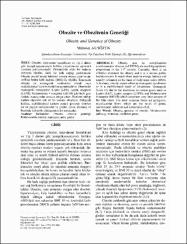Obezite ve obezitenin genetiği
Abstract
Obezite, kalp-damar hastalıkları ve Tip 2 diabet gibi komplikasyonlarıyla birlikte yüzyılımızda epidemik sınırlara yaklaşmaktadır. Günümüzde etkin bir tedavisi olmayan obezite, ciddi bir halk sağlığı problemidir. Obezite pozitif enerji bakiyesi sonucu ortaya çıkar ve genellikle beden kitle indeksi (BMI) ile ölçülür. İnsanlarda obezite ya monogenik sendromlar olarak veya multifaktöryel kalıtım modeline uymaktadirlar. Obezitenin monogenik versiyonları Leptin (LEP), Leptin reseptörü (LEPR), Melanocortin 4 reseptörü (MC4R) gibi belli genlerdeki mutasyonlar sonucu ortaya çıkar. Bunların sıklığı toplam olguların çok az bir kısmını oluşturur. Poligenik kalitim, multifaktöryel kalıtım modeli gösteren formları ise en yaygın versiyonudur ve genler, çevre, davranış ve hepsinin birbiriyle etkileşiminin bir sonucudur. Obesity and its complications
(cardiovascular disease and T2DM) are reaching epidemic proportions in the 21st century. Currently, there is no effective treatment for obesity and it is a serious public health concern. It results from positive energy balance and usually estimated on the basis of body-mass index (BMI). In humans, obesity occurs either as monogenic syndromes or in a multifactorial mode of inheritance. Monogenic forms are due to the mutations in certain genes such as Leptin (LEP), Leptin receptor (LEPR), and Melanocortin 4 receptor (MC4R) which constitute very little amount of the total cases. The most common forms are polygenic, multifactorial forms which are the result of genes, environment, behavior and interactions of all.
Source
Afyon Kocatepe Üniversitesi, Kocatepe Tıp DergisiVolume
7Issue
3Collections
- Makaleler [452]



















